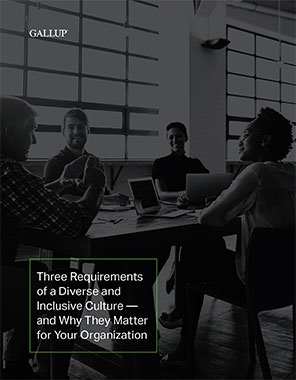Story Highlights
- Working mothers need an inclusive culture, too
- Employees excel with a long-term path in mind
- Organizations need to prove to women they are valued
There might be a hurdle that stands between your company and outcome-driving gender diversity: how inclusive your culture is for working mothers.
Why? Gallup analytics show that one factor has the greatest influence on women's decision to stay in the workforce or leave -- children.
In fact, 54% of working women in the U.S. (with children under the age of 18) would prefer to stay home. But some stay-at-home mothers might consider returning to work if the workplace was more accommodating.
This is a problem for leaders, because the benefits of gender diversity are well-established:
- superior team-level problem solving -- and, in turn, performance
- broader organizational knowledge and easier access to information
- better customer service
- improved attraction and retention
Being inclusive for working mothers isn't just about maternity leave or other fundamental expectations of exceptional workplaces.
An inclusive work culture embraces mothers and gives them what they need to return to work with confidence and purpose -- even enthusiasm.
On the other hand, a work environment that ignores mothers' needs is more than unwelcoming; it undercuts performance and can have a long-term effect on employee engagement.
Leaders must cultivate a culture that helps mothers reintegrate into the workplace, claim their identity as a working parent and chart renewed visions for career advancement.
The Far-Reaching Benefits of an Inclusive Work Culture
The payoffs of a welcoming culture are enormous -- far greater than attracting and retaining all-star female employees.
Inclusive organizations foster psychological commitment and emotional ownership among employees. In turn, the financial gains that come with gender diversity are dramatically accelerated.
And working moms aren't the only ones who flourish in a welcoming workplace.
For example, many new fathers assume the same childcare responsibilities as new mothers, often with shorter parental leave and a faster transition back to work.
In addition, any employee can face setbacks or changes -- such as an aging parent or an ailing spouse -- that are easier to navigate with a supportive workplace.
An inclusive work culture embraces mothers and gives them what they need to return to work with confidence and purpose -- even enthusiasm.
How do you begin? Consider these three strategies for empowering working mothers -- and honestly evaluate how well your culture meets the mark.
1. Prioritize communication for individualized support.
Some say that the only constant in parenting is change. Similarly, the transition back to work is rife with change -- and that journey will look different for everyone.
For example, a new mom who can't take a business trip during her first month back to work might be disappointed to miss such an opportunity only a few months later.
And whereas some mothers might prefer to resume responsibilities gradually, others might want to dive back in -- and would find it irritating to have their work delegated to coworkers.
The only way organizations can understand and cater to each woman's unique and evolving needs and preferences is through frequent, transparent communication.
Leaders must encourage managers to engage in regular discussions with employees about the demands they face at work and in life. These coaching conversations help employees reintegrate and reengage at work -- but only when employees feel like their manager truly cares about them as a person.
Managers need the right development, tools and resources to individualize their approach with each team member and to facilitate ongoing employee check-ins that deepen relationships and build trust.
2. Accommodate temporary performance fluctuations.
Employees excel in a workplace that helps them pave a path to their long-term career goals and aspirations.
At the same time, employees need an authentic work culture that recognizes that the journey to vocational success is often complicated and detour-filled. As mothers strive to find their new normal during the initial weeks (even months) after maternity leave, they might feel as though they've moved from the fast track to success to the slow lane.
For example, the sleepless nights so often associated with early parenthood reduce creative problem-solving skills and memory retention. Metrics, goals and tasks that were a cinch on a full night's sleep might feel impossible for employees transitioning back to work.
But such challenges are almost always temporary. The best organizations maintain accountability, incentivize exceptional performance and promote long-term career success -- while simultaneously supporting working moms through life's ups and downs.
To this end, great managers help returning employees view bumps in post-leave performance in the context of the bigger (still promising) career picture -- not a one-way exit to the "mommy track."
3. Reinforce your mission and purpose.
U.S. women are more likely than men to say that the mission or purpose of their company makes them feel their job is important.
However, mothers transitioning back to work might need to reconnect with their organization's mission after months of focusing almost exclusively on the needs of a new child.
The best organizations maintain accountability, incentivize exceptional performance and promote long-term career success -- while simultaneously supporting working moms through life's ups and downs.
It's up to leaders to ensure their work culture consistently reinforces and communicates its mission -- especially as mothers resume work responsibilities.
Doing so not only meets employees' desire for purpose-driven work, but also promotes business success. When employees are more connected to their organization's mission or purpose, outcomes such as safety, turnover and profitability significantly improve.
It's no secret that gender diversity and business performance go hand in hand -- it's why workplaces are fighting to score top female talent.
Organizations can prove that they value women by doing what it takes to support women through child-rearing years.
When leaders have working mothers' backs, they're doing what's right -- for their people, the bottom line and society.
Learn more about how Gallup can help your organization improve performance with a focus on engagement and inclusion:
- Download our Women in America: Work and Life Well-Lived report to gain greater insight into what matters most to women in the workforce.
- Start an open, honest dialogue at your company by learning how to build an inclusive culture.
- Inquire about our employee engagement solutions and start to build or strengthen your culture of engagement.



